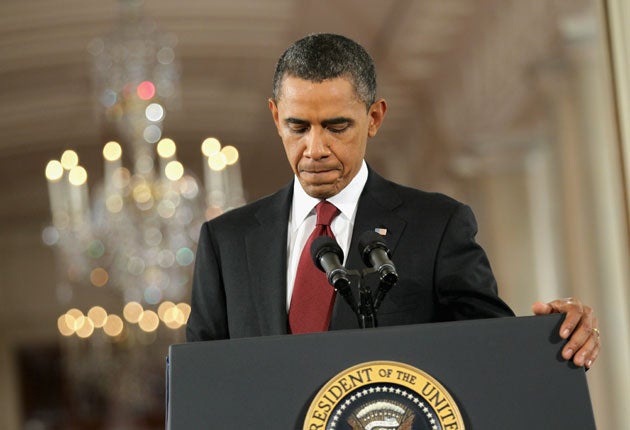Pressure on US as Clinton faces flak at summit

It will get personal very quickly for Hillary Clinton, the US Secretary of State. While all of Washington scrambled yesterday to contain the fallout from the leak of secret diplomatic cables, she will have some face-to-face explaining to do when she arrives at a European security summit in Kazakhstan tomorrow.
Of the many very bad things about this latest round of disclosures of how America conducts foreign policy, one is the timing – at least, for Mrs Clinton. After the Organisation for Security and Co-operation in Europe gathering, she travels to the Middle East, which was a focus of many of the leaked cables. Perhaps with that tour in mind, Mrs Clinton vehemently criticised the leaks last night and insisted that America's relationships would not be harmed.
"I am confident that the partnerships that the Obama administration has worked so hard to build will withstand this challenge," she said. "I want to make clear that our policy is not set in these messages but here in Washington." And, she added ominously, the US is "taking aggressive steps to hold responsible those to account".
The White House found itself under renewed pressure to shut down the Wikileaks site last night. Most extreme was a call by Congressman Peter King, a Republican who will soon chair the House Homeland Security Committee, to declare Wikileaks a terrorist organisation. Eric Holder, the US Attorney General, echoed Mrs Clinton when he sought to reassure critics that the US is already engaged in an "active and ongoing criminal investigation" into the release of classified documents by Wikileaks and he stands ready to prosecute anyone found responsible.
Meanwhile, the White House issued an order to all government agencies to strengthen procedures for handling secret or even semi-secret documents and reports. The new procedures would ensure "that users do not have broader access than is necessary to do their jobs effectively, as well as implementation of restrictions on usage of, and removal media capabilities from, classified government directives," according to the directive.
Even as some governments around the world may have been nursing quiet resentment at the contents of the leaks, many share the same outrage as the US over what Wikileaks has wrought. Canada was one of several countries saying relations with Washington would not be damaged. The French government spokesman and Budget Minister, François Baroin, said France wanted to support the US in defending diplomatic secrecy. He said: "We are very supportive of the American administration in its efforts to avoid what not only damages countries' authority and the quality of their services, but also endangers men and women working to defend their country."
Nonetheless, there was no disguising the potential for long-term damage to America's ties with a number of important countries around the world. Those that may have special cause for grievance or embarrassment because of the leaks include China, Saudi Arabia, Pakistan and Britain.
Even those parts of the trove that trade in tittle-tattle about the personality traits of foreign leaders threaten to cause trouble. Certainly, they will not make Mrs Clinton's job in Kazakhstan any easier.
Among those expected to sit with her are Russian President Dmitry Medvedev and German Chancellor Angela Merkel. While the latter is described in one cable as being "risk-averse", Mr Medvedev is portrayed in another as playing "Robin to [Prime Minister Vladimir] Putin's Batman".
Designating Wikileaks as a terrorist group would greatly widen the scope for possible legal action against it by the US.
But the proposal did not get the support of Joseph Lieberman, who chairs the Homeland Security panel in the Senate: "Normally, we reserve that designation for groups that fit the traditional definition of terrorism, which is that they are using violence to achieve a political end. While it's true that what Wikileaks did may result in damage to some people... it's not al-Qa'ida."
Join our commenting forum
Join thought-provoking conversations, follow other Independent readers and see their replies
Comments
Bookmark popover
Removed from bookmarks